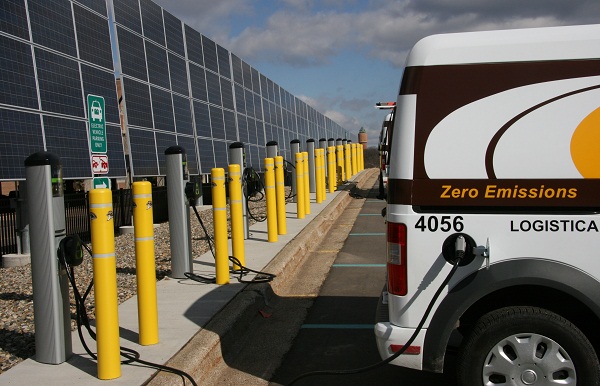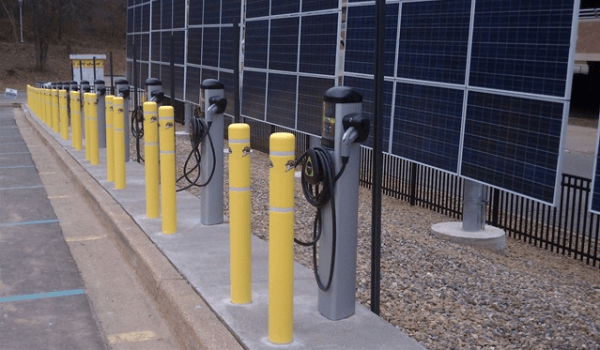Electric vehicle detractors love to deliver lectures about how EVs just substitute coal power for petroleum, providing little environmental benefit, which is only occasionally almost true and wildly off the mark in most cases.
To respond to these cranks, you can go into the number crunching that proves the case – or, if you live in Kalamazoo, Mich., you can plug in your EV at Western Michigan University.

A 50-kilowatt solay array went online on campus this year, and now 15 EV charging stations are drawing power from the sun.
Two-hundred sixteen Mage Solar modules – from Georgia, by the way – are mounted onto 18 poles in a parking lot across from the university’s James W. Miller Auditorium. Coulomb Technologies supplied the 15 level 2 chargers, which are part of the ChargePoint Network the company is building with help from the U.S. Department of Energy.
And this is nifty: Whereas Web-based power displays are common for solar installations, we’ve never seen a Web-based EV charging station consumption display – until now. Check it out. You can see that in May, the array produced 5,246 kilowatt-hours (kWh) of electricity, of which 1,139 kWh went directly to power vehicles. For the year, as of yesterday afternoon the array had produced 22.4 megawatt-hours (MWh) of energy, with just under quarter of that electricity – 5.25 MWh – used by the EV chargers.
Don’t worry about the power that doesn’t feed the chargers; the system is grid-tied, so it doesn’t go to waste.
The Clean Energy Coalition (CEC), a nonprofit funded by the U.S. Department of Energy and other state and private entities, provided the university a grant to help install the charging stations. It was Harold Glasser, executive director for campus sustainability at Western Michigan, who wrote the grant proposal that bagged the cash.
Glasser didn’t stop at the EV stations: he also sought and got for the university money for five all-electric Ford Transit Connect service vehicles as well as an electric hybrid-hydraulic bucket truck for use by the campus facilities staff.
With a 28 kWh lithium-ion battery pack, the Transit Connect has a range of roughly 80 miles on a full charge. The vehicle has a payload of just over 1,000 pounds, and has a top speed of 75 mph, although it’s unlikely the vans would ever need to use that speed on campus. Ford began selling the vans last summer.

“Electric vehicles and hybrid electric vehicles are still in their infancy, but WMU is leading the way to support widespread adoption,” Glasser said in a university statement. “The current situation is akin to when the density of gas stations was one of the limits to widespread adoption of the automobile. We are thrilled to be partnering with the Clean Energy Coalition to provide clean, green electric vehicle charging infrastructure for the campus community and everyone who visits our campus.”
A local firm, The Green Panel, designed, furnished and installed the Western Michigan system, and also provided the customized inverter and charging station monitoring systems.